Sustainability, Rurality, and Open Contracting - Open Gov #04
Compilation of current news on open government. Includes events, data, citizen labs, sustainability, rurality, and women.
Available in:
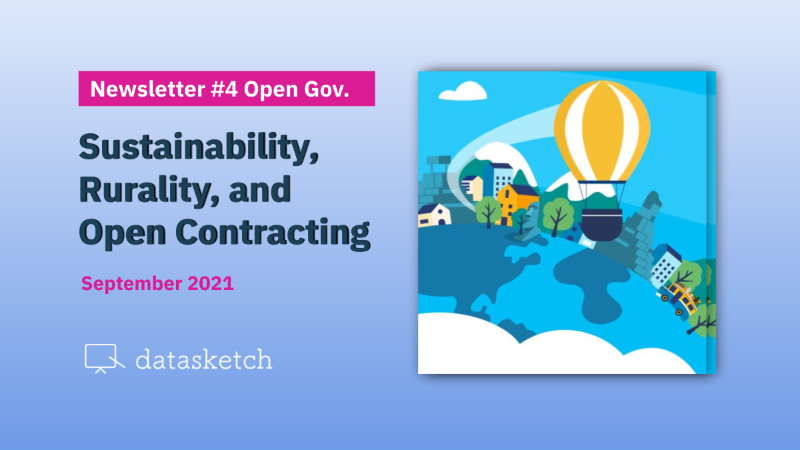
Have you reached us through social networks, or been forwarded this newsletter and want to receive it in your email twice a month? Subscribe!
You can read the Spanish version here.
We are Laura Tamia Ortiz, Gabriel Jiménez, María Juliana Rodríguez, and Juan Pablo Marín Díaz, a part of the Datasketch Open Government Team. If you want to read the previous newsletters, you can do so at Datasketch: Open Government Newsletter.
#EVENTS
Sustainable Territories and Participatory Democracy
The International Observatory for Participatory Democracy (IOPD) is organizing its 20th Conference. It aims to demonstrate and enhance the role of participatory and open democracy as a lever of change in local governance for action and co-creation of safe, inclusive, peaceful, sustainable, and resilient cities.
This edition will be held in Abidjan, the Ivory Coast capital. You can register and read more at https://www.oidp-cocody2021.ci/.
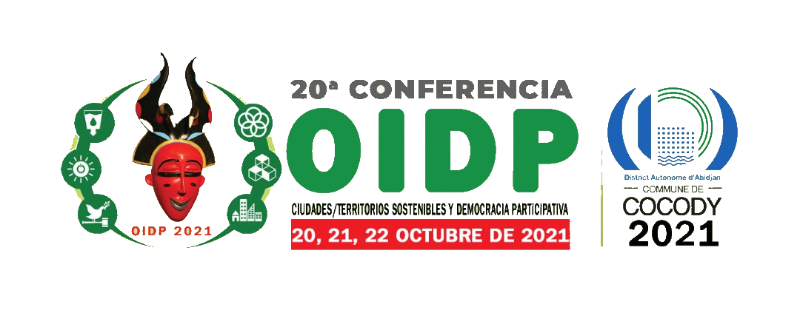
Civil Society Policy Forum
The Civil Society Policy Forum (CSPF) is part of the International Monetary Fund and World Bank Group Spring and Annual Meetings. It provides an open space for Civil Society Organizations (CSOs) to dialogue and exchange views with World Bank Group and IMF staff, peers, government delegations, and other stakeholders on a wide range of topics.
From September 27 through October 8, if you are part of a CSO, you will be able, to follow the sessions organized by the World Bank Group and the International Monetary Fund virtually.

#OGP
Co-creation and Participation Standards
OGP is collectively rethinking its Cocreation and Participation standards. It is a process that has already been going on for two years. It aims to update those already presented in 2016.
After this work time, they propose five standards, a restructuring of the same, and ask for citizen help to finish making adjustments to their proposal. For the first time (yes, you read that right), they have developed a platform that allows the community to interact and comment on the new proposed standards.
We consider this step relevant, as it shows a predisposition of the Organization to apply its recommendations. We invite everyone to participate, as they will be the standards that guide the creation and implementation of future action plans.
You can access, register, and leave your contributions at OGP Consultation.
Argentina makes progress
Argentina’s fourth Open Government Action Plan (es) has 18 commitments and includes an annex with mainstreaming gender and diversity recommendations. In addition, the country has published updates of its commitments so that any citizen can carry out their monitoring and know the status of implementation of each one of them.
The publication and dissemination of progress and indicators to measure it, based on evidence, are essential input and a requirement of OGP, which ensures transparency and enables social control.
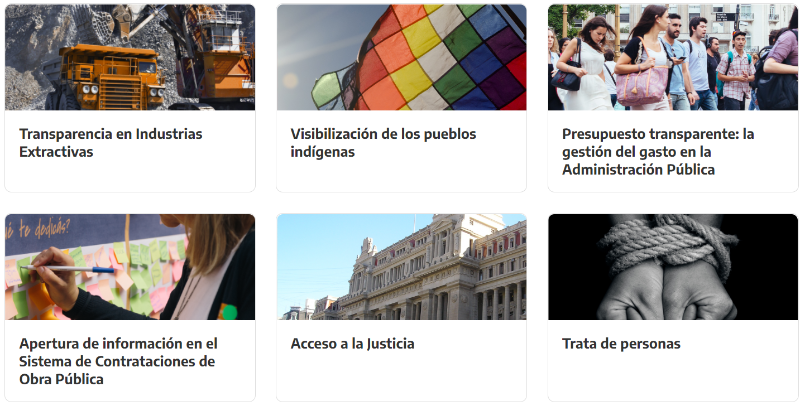
Panama has launched its IV Plan
The President of Panama, Laurentino Cortizo, launched the new National Open Government Action Plan. The Foundation for the Development of Citizen Freedom, Chapter of Transparency International, has said in a statement that it hopes it will be an opportunity for the country to catch up in terms of transparency.
One of the commitments highlighted in its statement is related to Open Budgets, under the Ministry of Economic and Finance responsibility, which seeks to adopt international standards of budget transparency contained in the methodology of the Open Budget Survey to improve the General State Budget.
Measure OGP National Action Plans
Datasketch offers consultancy services to different countries, such as Colombia and Ecuador, in the construction of indicators to measure National Open Government Action Plans and other related public policies. We analyze the context of each country, the status of the Plan, and, based on our experience and design thinking exercises, we propose the indicators that best suit the country, the best way to visualize the data, and the most suitable structure for the information repository.
If you are part of the multi-stakeholder forum in your country or need advice in this regard, contact us!
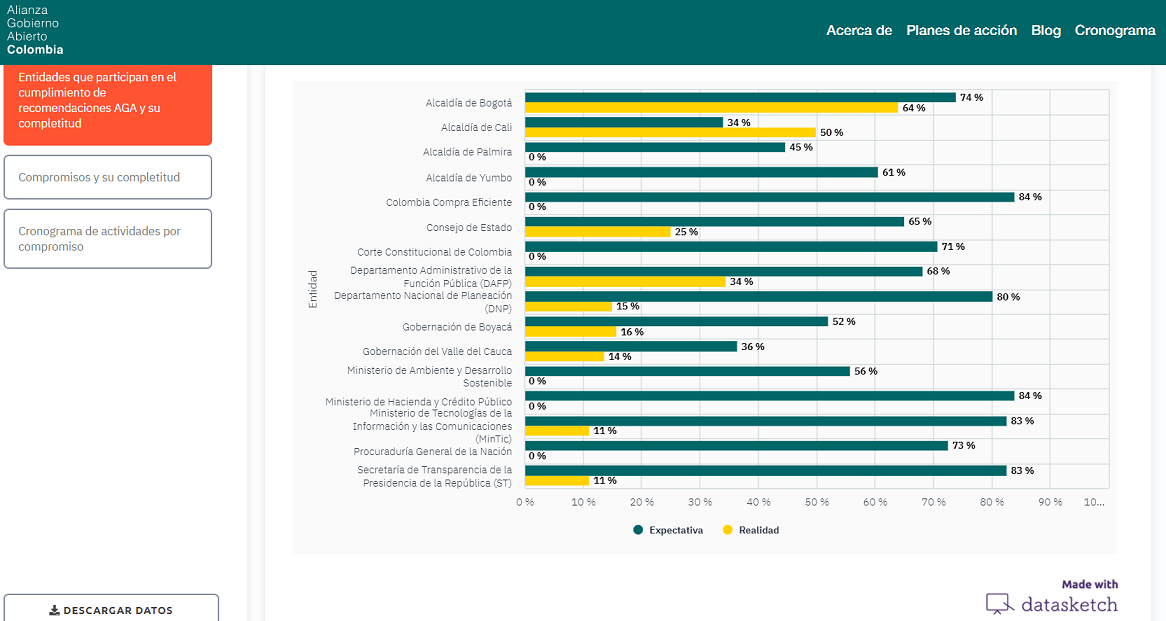
#TOOLS
Risks in asset and interest declarations.
Declarations of assets and interests of public officials have been used to promote integrity and fight corruption.
Through the StAR Initiative, the World Bank has published a technical guide that aims to analyze the risk of asset declarations through an electronic system that uses algorithms to detect risks in the declaration forms submitted according to pre-set indicators.
The publication offers advice on how to organize the process, what steps to take to develop the risk analysis framework, and addresses issues of integration with external data sources and the level of transparency of the system.

Open Contracting Quickstart Guide
Open Contracting Partnership (OCP) published a guide with 15 strategies and real-world examples of implementing open contracting to achieve fairer and more transparent public procurement.
Some of the essential strategies include: building a strong political mandate, conducting user research to understand needs and define use cases, digitizing paper-based systems, publishing pre-award planning and status information, integrating monitoring throughout the contracting system, and using strategic communications to gain support.
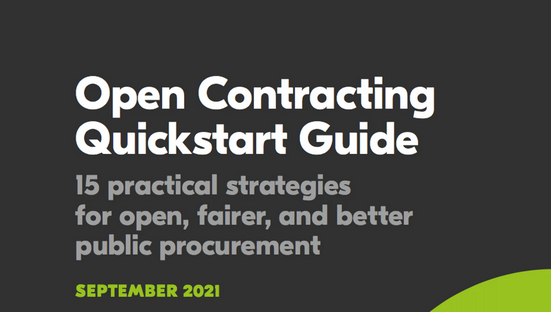
The guide seeks to engage the public and private sectors and civil society in using public procurement information and more effective processes for better public services and goods.
Most importantly, it is about open data and how it can help improve the monitoring and feedback of public procurement processes.
In our apps, you will find several tools that will allow you to upload and work with this type of information and identify, for example, the entities that signed the most expensive contracts per year in Colombia, the United Kingdom, and Portugal.
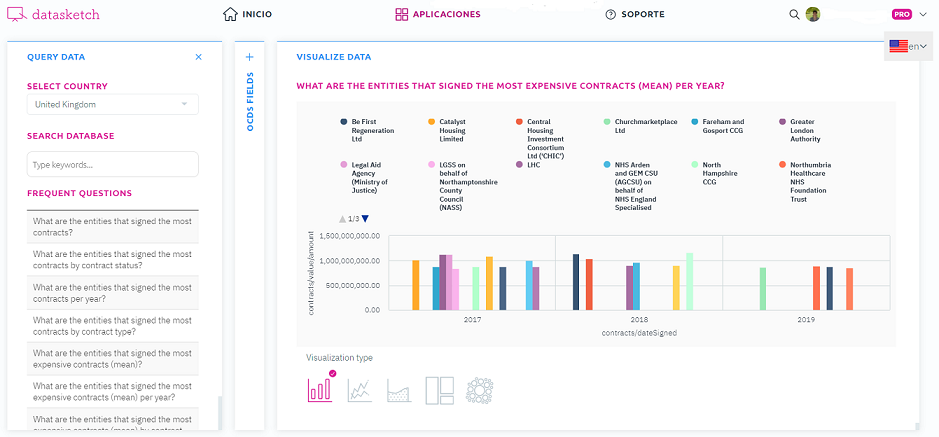
Voter Turnout
This database provides information on electoral participation worldwide. It has been compiled through International IDEA research and is updated periodically. Data on voter turnout in presidential and parliamentary elections worldwide since 1945 are available on it.
The search form offers filters such as country or region, type of election and allows downloading the data in a single file.
It is helpful information to measure the state of participation over time and, linked to contextual data, can be used to understand political movements and how they affect representative democracy.
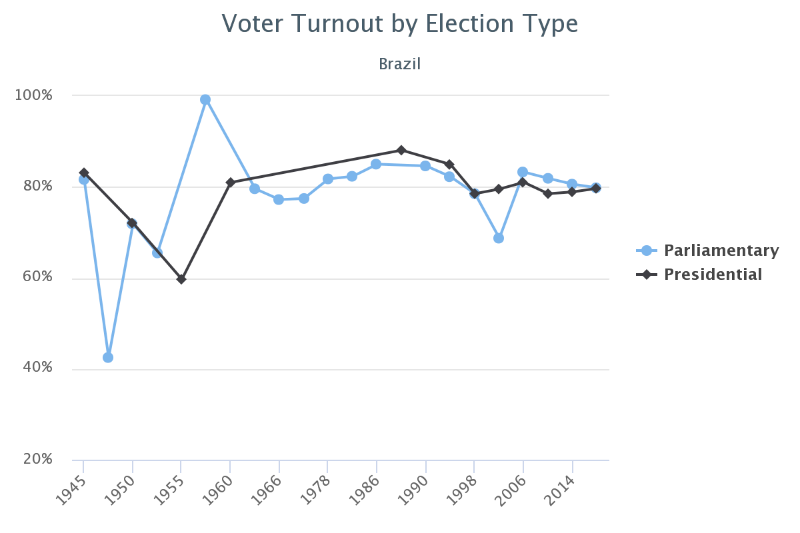
Data for public decision making
The Development Bank of Latin America has published a document that aims to show how data is a relevant ally for the public sector to design and implement public policies in Colombia.
It comprises a context of data analytics in the international context and Colombia’s bet to boost digital transformation and improve decision making. It is a practical guide for public entities. It is the result of the Manos en la Data-Colombia projects, where data analytics’s impact on problems arising from the COVID-19 health emergency is evidenced. You can read and download it here (es).
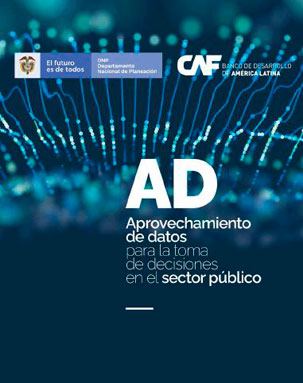
#COMMUNITY
Cities for Digital Rights Coalition
In 2018 Barcelona, New York, and Amsterdam created the Cities for Digital Rights Coalition, an alliance for protecting people’s digital rights on a global scale. It was born to propose laws, tools, and resources to protect both residents and visitors.
The network advocates for the defense of digital rights in rural contexts by solving citizens' digital problems. It already has more than 50 cities that have signed a declaration with five prioritized principles:
- Universal and equal access to the Internet + digital literacy.
- Privacy, data protection, and security.
- Transparency, accountability, and non-discrimination of data, content, and algorithms.
- Participatory democracy, diversity, and inclusion.
- Open and ethical digital service standards.

ImpactaLatam
It is a project that integrates 15 Latin American NGOs working on democracy, human rights, and governance. These organizations joined together to build instruments that facilitate the monitoring and evaluation processes of each organization.
The objective of ImpactaLatam (es) is to strengthen the competencies of the participating organizations to evaluate the impact of the projects they execute. At the same time, they seek to raise awareness about practices, promoting an integral culture that will affect the regional level.
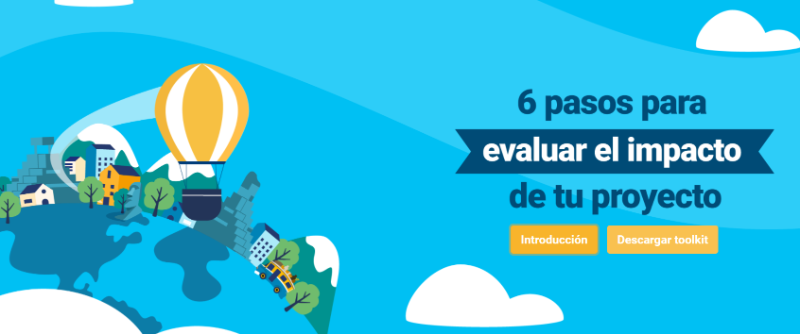
DataRepública
It is a Colombian Laboratory that promotes the use of data to measure and encourage compliance with the Sustainable Development Goals in Latin America, based on four components: Connect, makes available datasets associated with the SDGs; Learn, strengthens capacities for data analysis, processing and visualization; Publish, promotes the generation of knowledge through data stories that make social realities visible; Analyze, provides data that respond to variables of the SDG indicators in Latin America.
It brings together efforts of multiple actors, related to the data environment or not, including citizens. It offers face-to-face activities, called DataLiving Lab, and resources, such as online courses related to data advocacy and data journalism to fulfill SDGs. We invite you to learn more about this proposal at DataRepública (es).
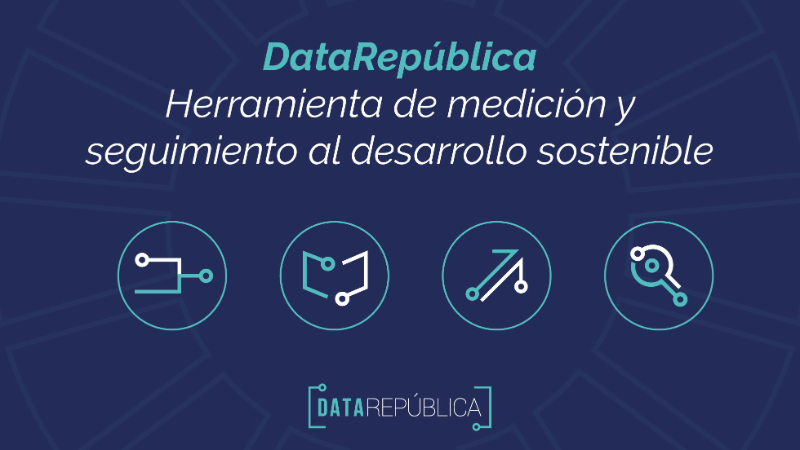
#NEWS
Mystery Client in public administrations
Four years ago, the Provincial Council of Castellón, Spain, created a collegiate body, the Provincial Council of Participatory Governance, which brings together civil society, public institutions, and the municipalities of the province.
This body authorized a new participatory process that seeks to incorporate the municipalities of the province’s municipalities and citizens in improving public services, procedures, and accountability of the Provincial Council.
A direct observation technique is used, the “Mystery Client.” Someone pretends to be an anonymous user whose mission is to analyze the quality of services - an innovative way of attacking a recurring problem. You can read the news on the website of the Provincial Council (es).
Rural women beyond unemployment
Eighty-one million people worldwide are considered inactive, i.e., they neither have nor are looking for work. According to this report by Corewoman and Cepei, women in the Global South are the most affected. That is because they have disproportionately borne the burden of care during COVID-19 and the loss of employment that hit feminized sectors the hardest.
Women in the Global South make up 43% of the agricultural workforce. Yet, the majority are often self-employed on their own farms or other people’s farms in informal, unrecognized, seasonal, part-time, low-wage jobs, overlapping care work, and having their rights violated.
Learn about the data supporting these claims and the policy recommendations to alleviate them in Gender and COVID #3.
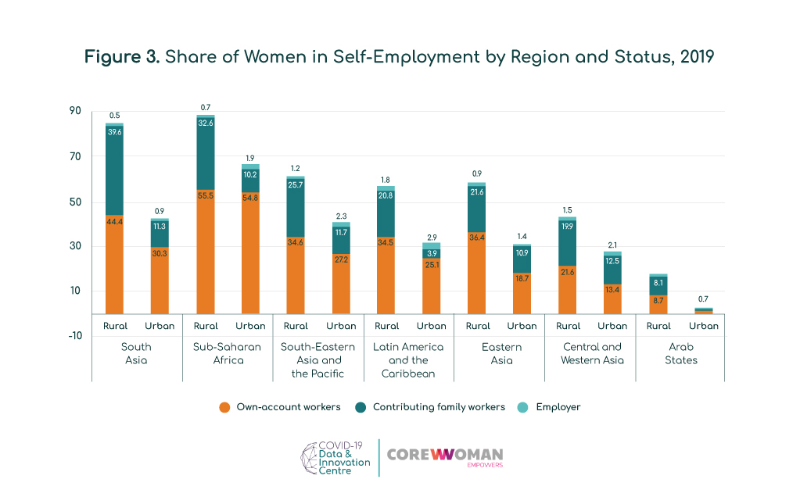
That's all for now!
If you liked the content, we invite you to share it with your friends and acquaintances. Furthermore, if you have reached us through social networks or have been forwarded this newsletter and want to receive it in your email twice a month, please subscribe!
We have other newsletters that may be of your interest.




